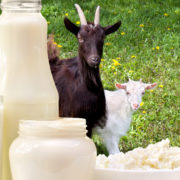China’s domestic goat milk prices are now “roller coaster” style plunge
China’s domestic goat milk industry suffered a cold spell in the summer of 2019. In Shanxi Province, the main producing area of Chinese goat milk, the purchase price of goat milk has plummeted since March this year, with a drop of more than 100%. In some areas, milk prices have even approached the breeding cost line. At the end of 2018, the purchase price was still around 8.5 yuan/kg (1.76 Australian dollars) , but from March 2019, the price suddenly began to decline, the purchase price directly fell back to 6.5 yuan/kg (1.35 Australian dollars), after half a month, the price began to fall all the way Until the current level of 4 yuan/kg (0.83 Australian dollars).
In recent months, China’s State Administration of Markets has launched a series of measures, such as the 100-day campaign to jointly rectify the “health care products” market, to rectify the health care products industry, which has also affected some goat milk powder enterprises. Some goat milk powder dealers have adopted a similar sales method as health care products and have also been rehabilitated.
Due to over-reliance on channels, some companies have to give up their profits. After the surge in the purchase price of goat milk in 2018, the profits of processing companies cannot cover the increase in costs, and they have to raise prices frequently. Some companies raise the price three times in the short term. Even more, this also disrupted the normal operation of the dealers, the enthusiasm of the dealers was damaged and the final sales were also affected.
For a long time, compared to the milk industry, the Chinese domestic goat milk industry is not large. Shanxi is the main goat milk producing area in China. According to public data, there are 34 goat milk powder production enterprises in Shanxi Province, including 19 infant formula milk powder enterprises. In 2018, Shanxi dairy goats had about 2.4 million stocks, 600,000 tons of milk, and an output value of 6.7 billion yuan. The output value of the entire industrial chain was 31.3 billion yuan.
In 2018, the Shanxi Provincial Government also proposed the 100 billion goat milk industry plan. The official information released recently shows that Shanxi will further accelerate the development of the goat milk industry, and strive to save 3 million dairy goats by 2020, with a total industrial chain output value of 35.5 billion. Yuan, by 2025, the output value of the goat milk industry has exceeded 100 billion yuan.
For example, in China, the current sales of the largest goat milk powder brand, Ausnutria (01717.HK)’s Kabrita, imported from the Netherlands, achieved sales of 2.03 billion yuan in 2018, an increase of nearly 60%. In recent years, the steady growth of the Chinese goat milk powder market has also attracted the attention of the major Chinese dairy companies.
Many respondents believe that in the face of imported products, the biggest advantage of local products is that the milk source is close to the consumers and can achieve more fresh products. Therefore, goat milk enterprises should have a longer-term vision and strategic layout.
If in the future, foreign farms are aware of China’s market opportunities and have a large number of converted dairy goats, then the Chinese domestic goat milk industry will also face the same import impact as milk.
Source: China Business News

